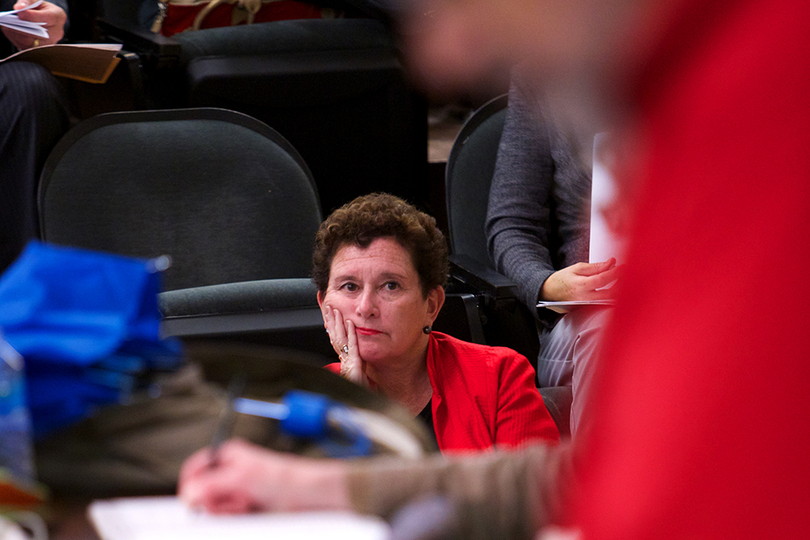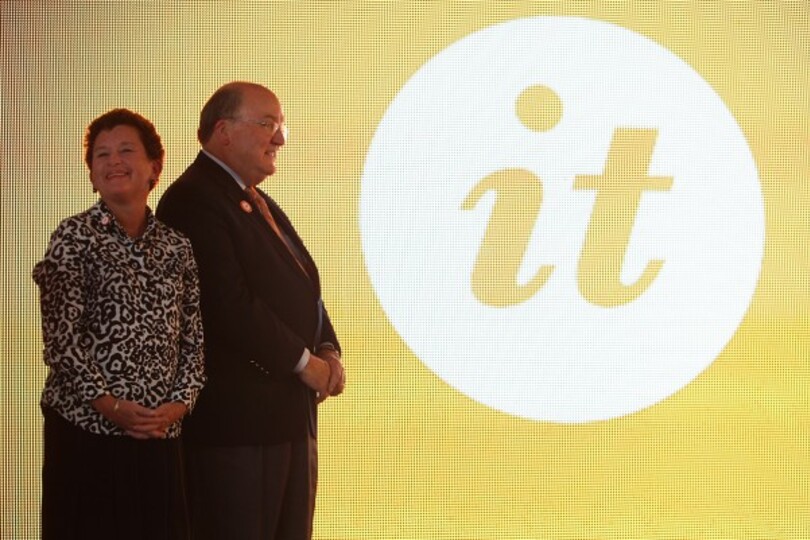Cantor to step down in 2014 after decade-long tenure, looks to push forward in final 3 semesters
UPDATED: Oct. 15, 2012, 2:31 a.m.
Nancy Cantor calls the timing of her decision to step down as chancellor of Syracuse University a “natural moment.”
“Ten years is a substantial amount of time to lead an institution,” she said in an interview with The Daily Orange on Friday morning, a little more than one hour after announcing her departure in a campus-wide email.
Cantor announced she will step down as soon as her contract ends in June 2014. By the time she leaves Syracuse University, she will have served nearly a decade as chancellor, as she was inaugurated in November 2004.
Cantor said she timed her announcement to coincide with the end of the Campaign for Syracuse University, which aimed to raise $1 billion by Dec. 31, 2012. SU reached that goal in September, three months ahead of schedule.
Though she has set a timeframe for her departure, Cantor said she plans to use her three semesters left at SU to continue mobilizing the several projects and initiatives she has helped foster, referring to her remaining time as a “period for energetic work and commitment.”
Cantor, the first female chancellor in SU’s history, created a philanthropic vision for the university. She solidified SU as an anchor institution through initiatives such as reviving the city of Syracuse’s Near Westside, helping rebuild the Syracuse City School District and assisting in the development of Syracuse’s Say Yes to Education program.
These initiatives are very critical to Cantor’s “enormous legacy” and “remarkable achievements,” said Richard Thompson, chairman of SU’s Board of Trustees.
“It really is amazing that in eight and a half years she’s sort of grabbed the university and pulled it into the 21st century,” Thompson said.
While Thompson said the board will continue to support Cantor’s initiatives through the next three semesters, Mary Lovely, an economics professor and chair of the Ad Hoc Committee on Enrollment in the University Senate, said the future of these initiatives may depend on the incoming chancellor.
“The initiatives will continue, but the next chancellor will want to put his or her own signature on the university,” she said. “They will also depend on the economic environment the chancellor finds themselves in.”
It remains unknown what the plans of the next chancellor are regarding the initiatives, she said. For example, the future of the chancellor’s role in Say Yes would depend on the level of leadership he or she chooses to have with the city of Syracuse.
“I’ve been here 23 years; I don’t think our relationship between the city and the county has been this good,” she said.
With the arrival of the new chancellor, Lovely said she hopes to see the continuing development of academic quality, something that can only be achieved through increased faculty leadership.
Now that Cantor has announced her departure date, Bruce Carter, chair of the USen Agenda Committee, said it is possible that USen discussion will change if people view Cantor as a “lame duck.” Faculty may try to push certain initiatives or hold back on discussion because of Cantor’s limited time with the university.
But Cantor seems to know what she plans to do with her remaining time at SU.
“She clearly laid out what she wants to keep doing,” Carter said, referencing Cantor’s email to the SU community sent Friday morning.
Carter acknowledged there has been controversy and heated discussion in USen meetings during Cantor’s tenure, but there will always be voices of dissent with any chancellor. The full extent of Cantor’s legacy will likely not be realized until five or 10 years after her departure, Carter said.
Thompson, chairman of the Board of Trustees, said the search for a new chancellor is not yet underway, but Cantor has given the board plenty of time to carry out the search.
Though Cantor wants to leave the selection for the new chancellor solely to the Board of Trustees, Thompson said the process would be discussed with her, as the selection would be important in preserving Cantor’s legacy.
“I’m totally committed to this place,” Cantor said. “I love it dearly, so I’ll do anything I can to help recruit great people here.”
As for Cantor’s husband, Steven Brechin, he will continue to work as a tenured faculty member in SU’s sociology department following Cantor’s departure, he said in an email.
Upon hearing the announcement that Cantor will step down, several deans responded with remarks of how beneficial Cantor’s leadership was to their respective schools.
George Langford, dean of the College of Arts and Sciences, said the chancellor was particularly devoted to the humanities and sciences, for which the school is grateful.
Elizabeth Liddy, dean of the School of Information Studies, said in an email that she personally has great admiration for Cantor.
“I am most appreciative of what a champion she has been for all of us here at the School of Information Studies,” she said.
During her tenure, Cantor faced several challenges and criticisms. Among the most notable of these were her shutting down HillTV, SU’s drop in the U.S. News & World Report’s rankings and last year’s allegations against former associate men’s basketball coach Bernie Fine.
When asked if these challenges had any affect on her decision to leave SU, Cantor said she always had the idea in mind of stepping down in 2014, at the end of her second contract.
“My contract is coming to an end, the decade is coming to an end,” she said. “I wanted to give the university plenty of time, but also energetically end with that sprint to the finish line.”
A chancellor running a large institution always has challenges, she said. Though they often are not as public as the Fine allegations, she said they exist. For example, the University of Michigan faced issues with affirmative action lawsuits while Cantor was provost there.
As of now, Cantor has no plans for after her departure from SU.
Said Cantor: “I love this place and feel very energized by both what we’ve done and also what’s ahead.”
— Staff Writer Dara McBride contributed reporting to this article.
Published on October 15, 2012 at 3:03 am
Contact Marwa: [email protected] | @marwaeltagouri
Related Stories
- Chancellor Nancy Cantor announces end of tenure when contract ends in June 2014
- Outside of SU, Cantor known for psychology work, higher education leadership
- Board of Trustees members reflect on Cantor's initiatives, leadership
- Alumni community both welcomes, regrets news of Cantor's 2014 departure
- Syracuse organizations hope to see Scholarship in Action carried out after Cantor's departure






